IGBOFOCUS
Ojukwu's January 1967 Press Conference on
Aburi Meeting
The following was Lieutenant-Colonel Chukwuemeka Odumegwu
Ojukwu, then the Military Governor of Eastern Nigeria, his Press
Conference on Aburi Meeting.
You are already aware that we have just ended the meeting of the
Supreme Military Council in Ghana. It has come to my notice that the
public is anxious to have more details of decisions taken.
The meeting opened with a joint declaration by all of us, the military
leaders, renouncing the use of force as a means of settling the present
crisis in Nigeria and holding ourselves in honour bound by that
declaration. That declaration also reaffirmed our faith in discussions and negotiations as the peaceful means of resolving the Nigerian
crisis. Having regard to the great fear and suspicion on all parts about the use of force, we thought that this declaration should
precede any other business; and I am sure that all Nigerians will welcome it as a source of great relief.
The next important matter discussed, and upon which a lot of other things hinged, was the organization of the Nigerian army. Let me
say here that our discussions right through went on in a calm atmosphere, understanding, and realism. We in the East have always
felt that realism and understanding were lacking in the past in the approach to our problems, and it was very encouraging that our
meetings on the two days showed the sincere determination by all to find realistic solutions to our problems.
It was agreed that the army will be henceforth be governed by the Supreme Military Council, the chairman of which will be known as
Commander-in-Chief and Head of the Federal Military Government. There is to be a military headquarters on which the regions will
be equally represented and which will be headed by a Chief of Staff. There shall be an area command in each region under the charge
of an area command in each region under the charge of an area commander -- the regions corresponding to the existing ones. There
will be a Lagos garrison, which will include Ikeja. For the duration of the military government, military governors will have control over
their area commands in matters of internal security. All matters of policy shall be dealt with by the Supreme Military Council. Any
decision affecting the whole country must be determined by the Supreme Military Council, and when a meeting is not possible, such a
matter must be referred to the military governors for comments and concurrence.
Subject to the above arrangements, we felt that the existing governmental institutions, namely, the Supreme Military Council and the
Federal Executive Council, as well as regional executive councils, are workable and should be retained.
It was agreed that the Supreme Military Council must collectively approve appointments to the following offices: a) diplomatic
consular posts; b) senior posts in the armed forces and the police; c) superscale federal corporation posts.
This particular decision was made as a means of removing friction, it being our unfortunate experience that friction and
misunderstanding had in the past bedevilled these appointments. What it means is that no one person will have the right and power
to make these appointments alone in the future.
Politically, it was unanimously agreed that it was in the interest of the safety of this nation that the regions should move slightly
further apart than before. As a prelude to this, it was decided that all decrees and parts of decrees promulgated since the military
regime, and which detracted from the previous powers of the regional governments, should be repealed by the twenty-first of this
month. Once this is done and the agreements are implemented, the aim of allowing the regions to operate more independently and
of ensuring fairness to all will be achieved.
The question of displaced persons was exhaustively discussed. As regards civil servants and employees of government corporations
who had to flee their places of work as a result of the current situation, it was decided that such people will be paid their full salaries
up to the end of March this year, unless they have found alternative employment.
On the question of other displaced persons, it was decided to set up a committee to look into the problems of rehabilitation and
recovery of property. I took that opportunity to repeat my assurance that those non easterners who had to be ordered to leave the
region in the interest of their own safety would be welcomed back as soon as conditions become more normal.
I have hurried to make this statement to you because of the misgivings which I understand are prevalent in the region as a result of
this meeting. I recall that just before my departure, when the public did not even know that our meeting was so close, students and
other groups of individuals issued resolutions advising me against attending any meeting with my counterparts. You will now be
convinced that this meeting was more than necessary and worthwhile. Our duty is to reduce or remove tension, in order to leave
ourselves free to tackle the most urgent and constructive tasks of economic and social development, which cannot be possible in a
state of tension and fear. I have no doubt that all of us who participated in the last discussions are determined to implement the
agreements reached. Once this is done, we shall have gone a long way to relieving tension and banishing fear among us. It is our plan
to meet again soon, this time in Nigeria, to consider other matters arising from our last discussions and those which were not
touched.
I want here to place on record my personal indebtedness to the government and people of Ghana for making a plane available to
convey me to and from the meetings on the two days, and for making other arrangements to make this meeting possible. Provided
our aims are achieved, we in this country will have cause to remain eternally grateful to Ghana for their constructive initiative.
For our part in this country, we must keep calm and avoid actions or words which might create difficulties for our progress in the
solution of our problems.
God will certainly rescue this nation from collapse and perdition.
That was Lieutenant Colonel Chukwuemeka Odumegwu Ojukwu’s January 1967 Press Conference on Aburi Meeting at Government
House, Enugu, Eastern Region.
For General Yakubu Gowon refusing to announce the outcome of Aburi Accord decision, he knew very well that Lt. Odumegwu-
Ojukwu would understand that there was no deal or there was no promise to honour the deal, even though the agreement was
signed by all parties. Yakubu Gowon on the contrary anticipating Odumegwu Ojukwu may soon call for new Aburi talks.
Lt. Odumegwu Ojukwu noticing that General Yakubu Gowon, his northerners and British stirrers were refusing the Aburi accord
decision, at the same time waiting for his next move.
Noticing or becoming aware that General Yakubu Gowon, his northerners and British instigators were refusing the signed Aburi
accord decision, Odumegwu Ojukwu set to conclude his subsequent swipe.
Determined not to be pushed aside, Lt. Odumegwu Ojukwu went to Calabar Prison which happened to be in the Eastern Region
where Chief Obafemi Awolowo was held prisoner.
Getting to Calabar prison, Odumegwu Ojukwu saw Chief Obafemi Awolwo where he had a
meeting with him. During the attendance, Odumegwu Ojukwu informed Chief Obafemi
Awolowo what he intended to do after Aburi accord had failed to be honoured by Yakubu
Gowon and his group.
Odumegwu-Ojukwu told Chief Obafemi Awolowo what the Eastern Region wanted, the
region wished to have their own country. Odumegwu Ojukwu told Chief Obafemi Awolowo
that he planned to declare Republic of Biafra on the 30th of May 1967. Chief Obafemi
Awolowo repeated what he said before to Odumegwu Ojukwu that “if you declare your
people Biafra, I will declare my people “Oduduwa.” Lt Odumegwu Ojukwu released Chief
Obafemi Awolowo from Calabar prison to go and in secret inform his people and get his
people ready to declare them Oduduwa once Biafra Republic is declared.
Odumegwu Ojukwu had in mind that if Chief Obafemi Awolowo had declared his people Oduduwa, north had no option but to form
their own northern government or own country in the north. Except, on the contrary they are still longing to fight Igbos, then Igbos
would destroy the north – no problem there. On the other hand with Yoruba combining the north to fight Igbo, it might be a difficult
task, Ojukwu reflected.
Once Chief Obafemi Awolowo was freed, instead of Chief Awolowo to go back to his
people to secretly inform them what is about to happen and getting them ready for
the declaration, he went to General Yakubu Gowon to inform him what Odumegwu
Ojukwu planned to do on the 30th May 1967. General Yakubu Gowon with such
information at hand, he was thankful to Chief Awolowo. To reward Chief Obafemi
Awolowo, and to get Yoruba people on his side for not joining Ojukwu to declare,
General Yakubu Gowon appointed Awolowo the Finance Minister while promising
him to be the next head of state after him.
Getting Odumegwu Ojukwu’s secret agenda from Chief Obafemi Awolowo, General
Yakubu Gowon expediently formulated a plan to hold Odumegwu Ojukwu back
from declaring Biafra Republic on the 30th of May 1967. As a result, Yakubu Gowon
thought of the obvious. General Yakubu Gowon believed changing regional system
to states system would discourage Lt. Odumegwu Ojukwu from declaring Biafra.
General Yakubu Gowon announced the changing of regional system to state system. On the 27th of May 1967, that is three days to go
before Odumegwu Ojukwu declare for Biafra Republic, General Yakubu Gowon revealed the division of Eastern Region into 3 states.
The creation of 3 states within the Eastern Region, as well as announcing the creation of other 9 states making a national total of 12
states for the country.
Principally, the idea behind the creation of 12 states would be to break Eastern Region down into three places namely; South Eastern
State, Rivers State and East Central State. This way, it will be impossible for Odumegwu Ojukwu to declare Biafra. Or else Odumegwu
Ojukwu may only have one state to declare, so Gowon had thought. Gowon thought using South Eastern State and Rivers State would
isolate East Central State which is where Yakubu Gowon anticipated that Odumegwu Ojukwu would declare Biafra Republic. Three
days after the creation of the new states, Odumegwu Ojukwu declared an independent sovereign state, Republic of Biafra.
On the 30th of May 1967, Lt. Colonel Odumegwu Ojukwu declared Republic of Biafra, the area declared comprising the old Eastern
Region by cancelling the new states created three days ago by General Yakubu Gowon.
Lieutenant Colonel Chukwuemeka Odumegwu Ojukwu, then the Military Governor of Eastern Region made a speech that declared
the sovereign state of Biafra and in the speech which brought about or resulted in the establishment of Republic of Biafra. The
following address was Ojukwu’s speech during the announcement of sovereign state of Biafra.
Ojukwu’s speech on sovereign state of Biafra
Fellow countrymen and women, you, the people of Eastern Nigeria:
Conscious of the supreme authority of Almighty God over all mankind, of
your duty to yourselves and prosperity; Aware that you can no longer be
protected in your lives and in your property by any Government based
outside eastern Nigeria; Believing that you are born free and have certain
inalienable rights which can best be preserved by yourselves; Unwilling to
be unfree partners in any association of a political or economic nature;
Rejecting the authority of any person or persons other than the Military
Government of eastern Nigeria to make any imposition of whatever kind
or nature upon you; Determined to dissolve all political and other ties
between you and the former Federal Republic of Nigeria; Prepared to
enter into such association, treaty or alliance with any sovereign state
within the former Federal Republic of Nigeria and elsewhere on such
terms and conditions as best to subserve your common good; Affirming your trust and confidence in me;
Having mandated me to proclaim on your behalf and in your name the Eastern Nigeria be a sovereign independent Republic.
Now Therefore I, Lieutenant Colonel Chukwuemeka Odumegwu Ojukwu, Military Governor of Eastern Nigeria, by virtue of the
authority, and pursuant to the principles recited above, do hereby solemnly proclaim that the territory and region known as and
called Eastern Nigeria together with her continental shelf and territorial waters shall henceforth be an independent sovereign state of
the name and title of The Republic of Biafra. And I Do Declare That: All political ties between us and the Federal Republic of Nigeria
are hereby totally dissolved.
All subsisting contractual obligations entered into by the Government of the federal republic of Nigeria or by any person, authority,
organization or government acting on its behalf, with any person, authority or organization operating, or relating to any matter or
thing, within the Republic of Biafra, shall henceforth be deemed to be entered into with the Military Governor of the Republic of Biafra
for and on behalf of the Government and people of the Republic of Biafra, and the covenants thereof shall, subject to this Declaration,
be performed by the parties according to their tenor; All subsisting international treaties and obligations made on behalf of Eastern
Nigeria by the Government of the Federal Republic of Nigeria shall be honoured and respected; Eastern Nigeria’s due share of all
subsisting international debts and obligations entered into by the Government of the Federal Republic of Nigeria shall be honoured
and respected; Steps will be taken to open discussions on the question of Eastern Nigeria’s due share of the assets of the Federation
of Nigeria and personal properties of the citizens of Biafra throughout the Federation of Nigeria.
The rights, privileges, pensions, etc., of all personnel of the Public Services, the Armed Forces and the Police now serving in any
capacity within the Republic of Biafra are hereby guaranteed; We shall keep the door open for association with, and would welcome,
any sovereign unit or units in the former Federation of Nigeria or any other parts of Africa desirous of association with us for the
purposes of running a common services organization and for the establishment of economic ties; We shall protect the lives and
property of all foreigners residing in Biafra, we shall extend the hand of friendship to those nations who respect our sovereignty, and
shall repel any interference in our internal affairs; We shall faithfully adhere to the charter of the Organization of African Unity and of
the United Nations Organization; It is our intention to remain a member of the British Commonwealth of Nations in our right as a
sovereign, independent nation.
Long live the Republic of Biafra!
And may God protect all those who live in her.
That was the Military Governor of Eastern Nigeria, Lieutenant-Colonel Chukwuemeka Odumegwu Ojukwu’s speech declaring the
sovereign state of Biafra.
Following the announcement of Republic of Biafra, the Nigeria Federal military almost immediately began attacking Biafra. Despite
the fact of being attacked by Nigeria soldiers, Biafra kept on protecting themselves.
Most of the initial attacks were through bombing, using federal military jets to attack Biafra.
At this stage Biafra engineers decide to do something about the jet bombers. Engineers in Biafra land then determined to build a toy
plane although they call it “drone” now, but the toy plane had bombs attached to it which they controlled remotely that went and
destroyed the federal fighter jets.
Before long a full-blown civil war ensued. As from July 1967, a Full-scale civil war broke out.
At the beginning of the war, Biafran soldiers didn’t have any weapons to fight the war with, all they had were locally made guns that
can only fire one or two bullet at a time. What Biafra soldiers decided to do were to ambush Nigeria soldiers, kill them and collect
their firearms and other military hardware from them. Soon Biafra soldiers had enough ammunition to prosecute the war.
After many ambushes of Nigeria soldiers, Biafra soldiers had enough or many aminations to linger the war. Whilst as matter of
urgency Biafra engineers were busy building new weapons.
TO BE CONTINUED
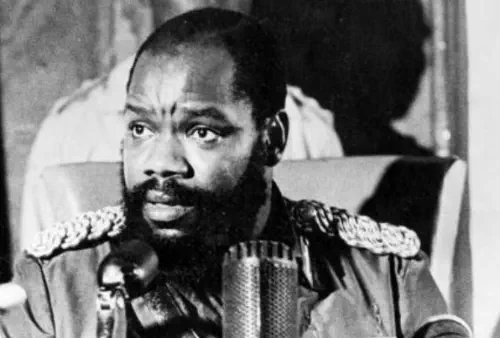
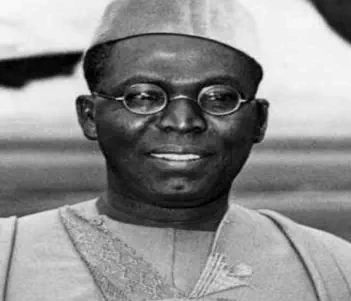
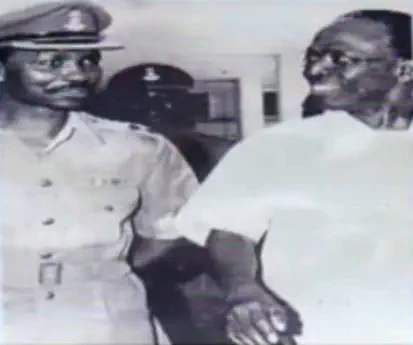
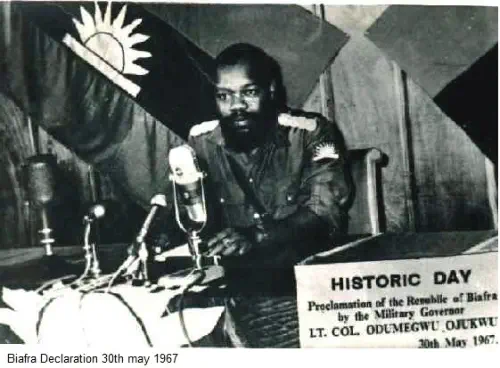






















•
Home
•
About Us
•
Biafra
•
Igbo Alphabet
•
Igbo Books
•
Igbo Cartoons
•
Contact Us
•
Igbo Names
•
Aburi Accord
•
Birds’ Names in Igbo Language
•
Drinks’ Names in Igbo Language
•
Everyday Igbo Words
•
Fruits’ Names in Igbo Language
•
Animals’ Names in Igbo Language
•
Human Parts in Igbo Language
•
Igbo Christian Music
•
Igbo Foods
•
Igbo Greetings
•
Igbo Language
•
Igbo Letter Writing
Copyright © Igbo Focus. All Rights Reserved.
•
Igbo Market Days
•
Igbo Modern Music
•
Igbo Music
•
Igbo Numbers
•
Igbo Photos
•
Igbo Traditional Music
•
Igbo Videos
•
Insects’ Names in Igbo Language
•
News
•
Newspapers
•
Nigeria Biafra War
•
Plants & Trees’ Names in Igbo Language
•
Reptiles’ Names in Igbo Language
•
Support Igbo Focus
•
The Obi Family
•
The Use of Kedu in Igbo Language
•
The Use of Na in Igbo Language
•
The Use of Wete in Igbo Language
•
The Use of Ya in Igbo Language
•
Vehicles’ Names in Igbo Language
Ojukwu's January 1967 Press
Conference on Aburi
Meeting
The following was Lieutenant-Colonel
Chukwuemeka Odumegwu Ojukwu, then the
Military Governor of Eastern Nigeria, his Press
Conference on Aburi Meeting.
You are already aware that we have just ended
the meeting of the Supreme Military Council in
Ghana. It has come to my notice that the public
is anxious to have more details of decisions
taken.
The meeting opened with a joint declaration by
all of us, the military leaders, renouncing the
use of force as a means of settling the present
crisis in Nigeria and holding ourselves in
honour bound by that declaration. That
declaration also reaffirmed our faith in
discussions and negotiations as the peaceful
means of resolving the Nigerian crisis. Having
regard to the great fear and suspicion on all
parts about the use of force, we thought that
this declaration should precede any other
business; and I am sure that all Nigerians will
welcome it as a source of great relief.
The next important matter discussed, and upon
which a lot of other things hinged, was the
organization of the Nigerian army. Let me say
here that our discussions right through went on
in a calm atmosphere, understanding, and
realism. We in the East have always felt that
realism and understanding were lacking in the
past in the approach to our problems, and it
was very encouraging that our meetings on the
two days showed the sincere determination by
all to find realistic solutions to our problems.
It was agreed that the army will be henceforth
be governed by the Supreme Military Council,
the chairman of which will be known as
Commander-in-Chief and Head of the Federal
Military Government. There is to be a military
headquarters on which the regions will be
equally represented and which will be headed
by a Chief of Staff. There shall be an area
command in each region under the charge of
an area command in each region under the
charge of an area commander -- the regions
corresponding to the existing ones. There will
be a Lagos garrison, which will include Ikeja.
For the duration of the military government,
military governors will have control over their
area commands in matters of internal security.
All matters of policy shall be dealt with by the
Supreme Military Council. Any decision
affecting the whole country must be
determined by the Supreme Military Council,
and when a meeting is not possible, such a
matter must be referred to the military
governors for comments and concurrence.
Subject to the above arrangements, we felt that
the existing governmental institutions, namely,
the Supreme Military Council and the Federal
Executive Council, as well as regional executive
councils, are workable and should be retained.
It was agreed that the Supreme Military Council
must collectively approve appointments to the
following offices: a) diplomatic consular posts;
b) senior posts in the armed forces and the
police; c) superscale federal corporation posts.
This particular decision was made as a means
of removing friction, it being our unfortunate
experience that friction and misunderstanding
had in the past bedevilled these appointments.
What it means is that no one person will have
the right and power to make these
appointments alone in the future.
Politically, it was unanimously agreed that it
was in the interest of the safety of this nation
that the regions should move slightly further
apart than before. As a prelude to this, it was
decided that all decrees and parts of decrees
promulgated since the military regime, and
which detracted from the previous powers of
the regional governments, should be repealed
by the twenty-first of this month. Once this is
done and the agreements are implemented,
the aim of allowing the regions to operate more
independently and of ensuring fairness to all
will be achieved.
The question of displaced persons was
exhaustively discussed. As regards civil servants
and employees of government corporations
who had to flee their places of work as a result
of the current situation, it was decided that
such people will be paid their full salaries up to
the end of March this year, unless they have
found alternative employment.
On the question of other displaced persons, it
was decided to set up a committee to look into
the problems of rehabilitation and recovery of
property. I took that opportunity to repeat my
assurance that those non easterners who had
to be ordered to leave the region in the interest
of their own safety would be welcomed back as
soon as conditions become more normal.
I have hurried to make this statement to you
because of the misgivings which I understand
are prevalent in the region as a result of this
meeting. I recall that just before my departure,
when the public did not even know that our
meeting was so close, students and other
groups of individuals issued resolutions
advising me against attending any meeting with
my counterparts. You will now be convinced
that this meeting was more than necessary and
worthwhile. Our duty is to reduce or remove
tension, in order to leave ourselves free to
tackle the most urgent and constructive tasks
of economic and social development, which
cannot be possible in a state of tension and
fear. I have no doubt that all of us who
participated in the last discussions are
determined to implement the agreements
reached. Once this is done, we shall have gone
a long way to relieving tension and banishing
fear among us. It is our plan to meet again
soon, this time in Nigeria, to consider other
matters arising from our last discussions and
those which were not touched.
I want here to place on record my personal
indebtedness to the government and people of
Ghana for making a plane available to convey
me to and from the meetings on the two days,
and for making other arrangements to make
this meeting possible. Provided our aims are
achieved, we in this country will have cause to
remain eternally grateful to Ghana for their
constructive initiative.
For our part in this country, we must keep calm
and avoid actions or words which might create
difficulties for our progress in the solution of
our problems.
God will certainly rescue this nation from
collapse and perdition.
That was Lieutenant Colonel Chukwuemeka
Odumegwu Ojukwu’s January 1967 Press
Conference on Aburi Meeting at Government
House, Enugu, Eastern Region.
For General Yakubu Gowon refusing to
announce the outcome of Aburi Accord
decision, he knew very well that Lt. Odumegwu-
Ojukwu would understand that there was no
deal or there was no promise to honour the
deal, even though the agreement was signed by
all parties. Yakubu Gowon on the contrary
anticipating Odumegwu Ojukwu may soon call
for new Aburi talks.
Lt. Odumegwu Ojukwu noticing that General
Yakubu Gowon, his northerners and British
stirrers were refusing the Aburi accord
decision, at the same time waiting for his next
move.
Noticing or becoming aware that General
Yakubu Gowon, his northerners and British
instigators were refusing the signed Aburi
accord decision, Odumegwu Ojukwu set to
conclude his subsequent swipe.
Determined not to be pushed aside, Lt.
Odumegwu Ojukwu went to Calabar Prison
which happened to be in the Eastern Region
where Chief Obafemi Awolowo was held
prisoner.
Getting to Calabar prison, Odumegwu Ojukwu
saw Chief Obafemi Awolwo where he had a
meeting with him. During the attendance,
Odumegwu Ojukwu informed Chief Obafemi
Awolowo what he intended to do after Aburi
accord had failed to be honoured by Yakubu
Gowon and his group.
Odumegwu-Ojukwu told Chief Obafemi
Awolowo what the Eastern Region wanted, the
region wished to have their own country.
Odumegwu Ojukwu told Chief Obafemi
Awolowo that he planned to declare Republic
of Biafra on the 30th of May 1967. Chief
Obafemi Awolowo repeated what he said
before to Odumegwu Ojukwu that “if you
declare your people Biafra, I will declare my
people “Oduduwa.” Lt Odumegwu Ojukwu
released Chief Obafemi Awolowo from Calabar
prison to go and in secret inform his people
and get his people ready to declare them
Oduduwa once Biafra Republic is declared.
Odumegwu Ojukwu had in mind that if Chief
Obafemi Awolowo had declared his people
Oduduwa, north had no option but to form
their own northern government or own country
in the north. Except, on the contrary they are
still longing to fight Igbos, then Igbos would
destroy the north – no problem there. On the
other hand with Yoruba combining the north to
fight Igbo, it might be a difficult task, Ojukwu
reflected.
Once Chief Obafemi Awolowo was freed,
instead of Chief Awolowo to go back to his
people to secretly inform them what is about to
happen and getting them ready for the
declaration, he went to General Yakubu Gowon
to inform him what Odumegwu Ojukwu
planned to do on the 30th May 1967. General
Yakubu Gowon with such information at hand,
he was thankful to Chief Awolowo. To reward
Chief Obafemi Awolowo, and to get Yoruba
people on his side for not joining Ojukwu to
declare, General Yakubu Gowon appointed
Awolowo the Finance Minister while promising
him to be the next head of state after him.
Getting Odumegwu Ojukwu’s secret agenda
from Chief Obafemi Awolowo, General Yakubu
Gowon expediently formulated a plan to hold
Odumegwu Ojukwu back from declaring Biafra
Republic on the 30th of May 1967. As a result,
Yakubu Gowon thought of the obvious. General
Yakubu Gowon believed changing regional
system to states system would discourage Lt.
Odumegwu Ojukwu from declaring Biafra.
General Yakubu Gowon announced the
changing of regional system to state system.
On the 27th of May 1967, that is three days to
go before Odumegwu Ojukwu declare for
Biafra Republic, General Yakubu Gowon
revealed the division of Eastern Region into 3
states. The creation of 3 states within the
Eastern Region, as well as announcing the
creation of other 9 states making a national
total of 12 states for the country.
Principally, the idea behind the creation of 12
states would be to break Eastern Region down
into three places namely; South Eastern State,
Rivers State and East Central State. This way, it
will be impossible for Odumegwu Ojukwu to
declare Biafra. Or else Odumegwu Ojukwu may
only have one state to declare, so Gowon had
thought. Gowon thought using South Eastern
State and Rivers State would isolate East
Central State which is where Yakubu Gowon
anticipated that Odumegwu Ojukwu would
declare Biafra Republic. Three days after the
creation of the new states, Odumegwu Ojukwu
declared an independent sovereign state,
Republic of Biafra.
On the 30th of May 1967, Lt. Colonel
Odumegwu Ojukwu declared Republic of
Biafra, the area declared comprising the old
Eastern Region by cancelling the new states
created three days ago by General Yakubu
Gowon.
Lieutenant Colonel Chukwuemeka Odumegwu
Ojukwu, then the Military Governor of Eastern
Region made a speech that declared the
sovereign state of Biafra and in the speech
which brought about or resulted in the
establishment of Republic of Biafra. The
following address was Ojukwu’s speech during
the announcement of sovereign state of Biafra.
Ojukwu’s speech on
sovereign state of Biafra
Fellow countrymen and women, you, the
people of Eastern Nigeria: Conscious of the
supreme authority of Almighty God over all
mankind, of your duty to yourselves and
prosperity; Aware that you can no longer be
protected in your lives and in your property by
any Government based outside eastern
Nigeria; Believing that you are born free and
have certain inalienable rights which can best
be preserved by yourselves; Unwilling to be
unfree partners in any association of a political
or economic nature; Rejecting the authority of
any person or persons other than the Military
Government of eastern Nigeria to make any
imposition of whatever kind or nature upon
you; Determined to dissolve all political and
other ties between you and the former Federal
Republic of Nigeria; Prepared to enter into such
association, treaty or alliance with any
sovereign state within the former Federal
Republic of Nigeria and elsewhere on such
terms and conditions as best to subserve your
common good; Affirming your trust and
confidence in me;
Having mandated me to proclaim on your
behalf and in your name the Eastern Nigeria be
a sovereign independent Republic.
Now Therefore I, Lieutenant Colonel
Chukwuemeka Odumegwu Ojukwu, Military
Governor of Eastern Nigeria, by virtue of the
authority, and pursuant to the principles
recited above, do hereby solemnly proclaim
that the territory and region known as and
called Eastern Nigeria together with her
continental shelf and territorial waters shall
henceforth be an independent sovereign state
of the name and title of The Republic of Biafra.
And I Do Declare That: All political ties between
us and the Federal Republic of Nigeria are
hereby totally dissolved.
All subsisting contractual obligations entered
into by the Government of the federal republic
of Nigeria or by any person, authority,
organization or government acting on its
behalf, with any person, authority or
organization operating, or relating to any
matter or thing, within the Republic of Biafra,
shall henceforth be deemed to be entered into
with the Military Governor of the Republic of
Biafra for and on behalf of the Government and
people of the Republic of Biafra, and the
covenants thereof shall, subject to this
Declaration, be performed by the parties
according to their tenor; All subsisting
international treaties and obligations made on
behalf of Eastern Nigeria by the Government of
the Federal Republic of Nigeria shall be
honoured and respected; Eastern Nigeria’s due
share of all subsisting international debts and
obligations entered into by the Government of
the Federal Republic of Nigeria shall be
honoured and respected; Steps will be taken to
open discussions on the question of Eastern
Nigeria’s due share of the assets of the
Federation of Nigeria and personal properties
of the citizens of Biafra throughout the
Federation of Nigeria.
The rights, privileges, pensions, etc., of all
personnel of the Public Services, the Armed
Forces and the Police now serving in any
capacity within the Republic of Biafra are
hereby guaranteed; We shall keep the door
open for association with, and would welcome,
any sovereign unit or units in the former
Federation of Nigeria or any other parts of
Africa desirous of association with us for the
purposes of running a common services
organization and for the establishment of
economic ties; We shall protect the lives and
property of all foreigners residing in Biafra, we
shall extend the hand of friendship to those
nations who respect our sovereignty, and shall
repel any interference in our internal affairs;
We shall faithfully adhere to the charter of the
Organization of African Unity and of the United
Nations Organization; It is our intention to
remain a member of the British
Commonwealth of Nations in our right as a
sovereign, independent nation.
Long live the Republic of Biafra!
And may God protect all those who live in her.
That was the Military Governor of Eastern
Nigeria, Lieutenant-Colonel Chukwuemeka
Odumegwu Ojukwu’s speech declaring the
sovereign state of Biafra.
Following the announcement of Republic of
Biafra, the Nigeria Federal military almost
immediately began attacking Biafra. Despite
the fact of being attacked by Nigeria soldiers,
Biafra kept on protecting themselves.
Most of the initial attacks were through
bombing, using federal military jets to attack
Biafra.
At this stage Biafra engineers decide to do
something about the jet bombers. Engineers in
Biafra land then determined to build a toy
plane although they call it “drone” now, but the
toy plane had bombs attached to it which they
controlled remotely that went and destroyed
the federal fighter jets.
Before long a full-blown civil war ensued. As
from July 1967, a Full-scale civil war broke out.
At the beginning of the war, Biafran soldiers
didn’t have any weapons to fight the war with,
all they had were locally made guns that can
only fire one or two bullet at a time. What
Biafra soldiers decided to do were to ambush
Nigeria soldiers, kill them and collect their
firearms and other military hardware from
them. Soon Biafra soldiers had enough
ammunition to prosecute the war.
After many ambushes of Nigeria soldiers, Biafra
soldiers had enough or many aminations to
linger the war. Whilst as matter of urgency
Biafra engineers were busy building new
weapons.
TO BE CONTINUED
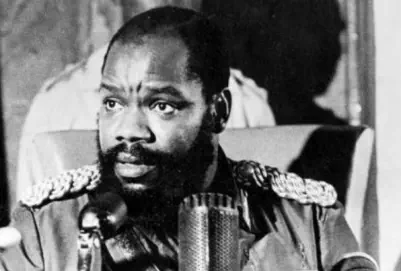
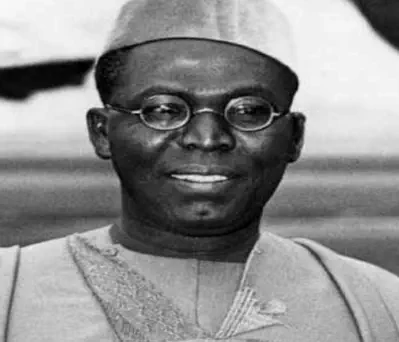
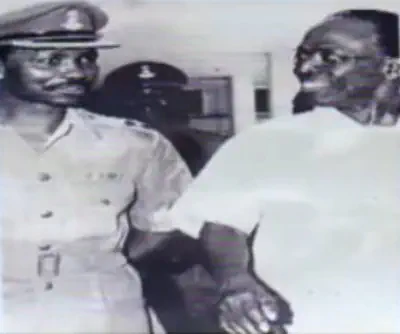
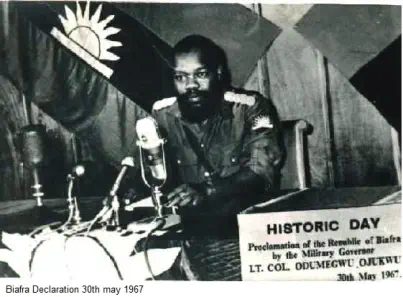
•
Home
•
About Us
•
Biafra
•
Igbo Alphabet
•
Igbo Books
•
Igbo Cartoons
•
Contact Us
•
Igbo Names
•
Aburi Accord
•
Birds’ Names in Igbo Language
•
Drinks’ Names in Igbo Language
•
Everyday Igbo Words
•
Fruits’ Names in Igbo Language
•
Animals’ Names in Igbo Language
•
Human Parts in Igbo Language
•
Igbo Christian Music
•
Igbo Foods
•
Igbo Greetings
•
Igbo Language
•
Igbo Letter Writing
•
Igbo Market Days
•
Igbo Modern Music
•
Igbo Music
•
Igbo Numbers
•
Igbo Photos
•
Igbo Traditional Music
•
Igbo Videos
•
Insects’ Names in Igbo Language
•
News
•
Newspapers
•
Nigeria Biafra War
•
Plants & Trees’ Names in Igbo Language
•
Reptiles’ Names in Igbo Language
•
Support Igbo Focus
•
The Obi Family
•
The Use of Kedu in Igbo Language
•
The Use of Na in Igbo Language
•
The Use of Wete in Igbo Language
•
The Use of Ya in Igbo Language
•
Vehicles’ Names in Igbo Language
Copyright © Igbo Focus. All Rights Reserved.
